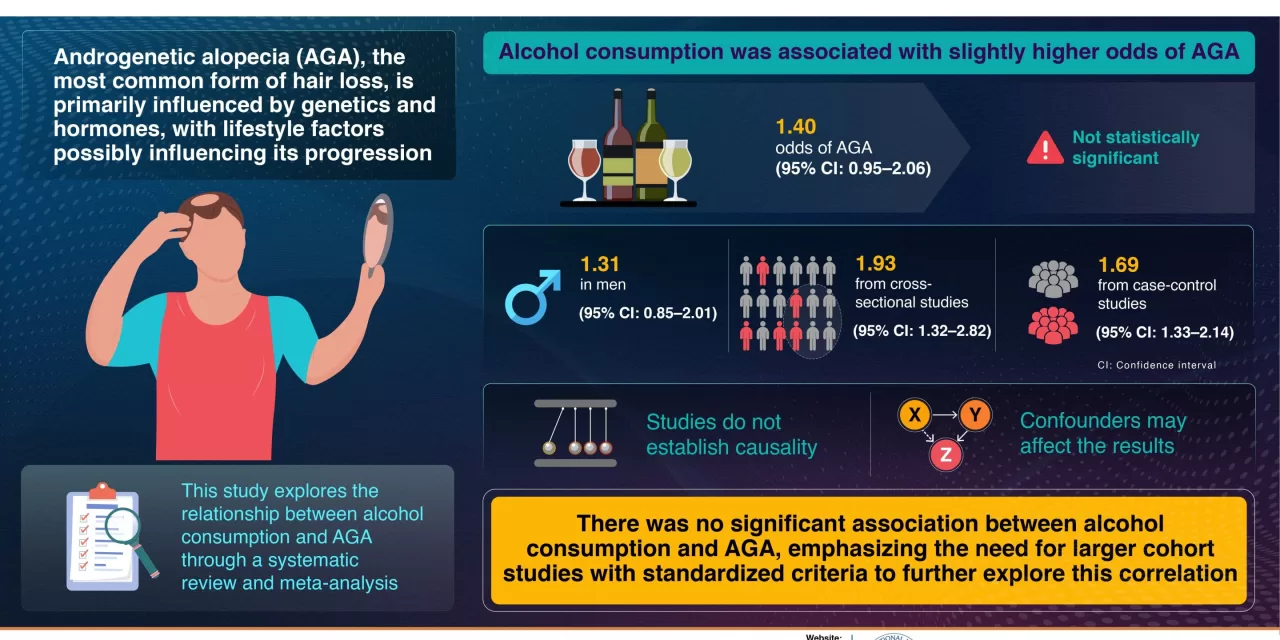November 27, 2024
A recent study sheds light on a potential link between alcohol consumption and androgenetic alopecia (AGA), the most common form of hair loss affecting millions of men and women worldwide. While AGA is primarily associated with genetic and hormonal factors, researchers are exploring lifestyle influences, including alcohol use, to better understand its causes and potential treatments.
Led by Professor Yun Hak Kim from Pusan National University’s School of Medicine, the study is the first systematic review and meta-analysis to examine the connection between alcohol intake and AGA. Published in the journal Alcohol and Alcoholism on November 11, 2024, the research reveals a nuanced picture.
“The study found that although individuals who consume alcohol may have a slightly higher likelihood of experiencing AGA compared to non-drinkers, this association is not statistically significant,” said Prof. Kim. The analysis showed that drinkers had a 1.4 times higher odds of AGA compared to non-drinkers, but with significant uncertainty.
Mixed Evidence
The researchers analyzed various studies, including cross-sectional, case-control, and cohort designs. While cross-sectional and case-control studies suggested a modest association between alcohol consumption and AGA, cohort studies, which are generally more reliable, did not confirm this link. This inconsistency highlights the need for further investigation.
One possible mechanism under scrutiny involves acetaldehyde, a byproduct of alcohol metabolism, which may disrupt the immune environment of the scalp. However, this hypothesis remains speculative, as no direct evidence has been established.
Calls for Rigorous Research
To clarify the potential role of alcohol in hair loss, the researchers urge more high-quality cohort studies with standardized criteria for diagnosing AGA and consistent definitions of alcohol use. They argue that these improvements are essential to generate more definitive conclusions.
“Our research could inform public health guidance, patient counseling, and targeted awareness campaigns, helping individuals make informed lifestyle choices regarding hair health,” Prof. Kim emphasized. “Over time, this could lead to more comprehensive, personalized strategies for preventing and treating hair loss.”
The findings add to a growing body of research aimed at uncovering how lifestyle factors like diet, smoking, and alcohol consumption may interact with genetic predispositions to influence hair health.
Looking Ahead
While the study does not provide a conclusive link between alcohol and AGA, it represents a significant step toward understanding how lifestyle choices might contribute to hair loss. Researchers hope the study will pave the way for more personalized approaches to managing and preventing hair loss, integrating genetics, diet, and lifestyle into comprehensive care plans.
For more details, refer to the original publication: Won Jin Yang et al., Exploring the association between alcohol consumption and androgenic alopecia: a systematic review and meta-analysis, Alcohol and Alcoholism (2024). DOI: 10.1093/alcalc/agae076.












